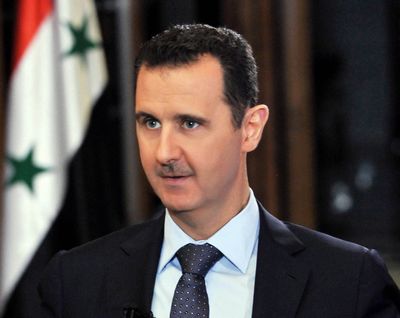Rocket trajectory links attack to Syria
But nation’s leader says terrorists are to blame

BEIRUT – The trajectory of the rockets that delivered the nerve agent sarin in last month’s deadly attack is among the key evidence linking elite Syrian troops based in the mountains overlooking Damascus to the strike that killed hundreds of people, diplomats and human rights officials said Wednesday.
That evidence, however, was dismissed by Syrian President Bashar Assad, who denied that his regime carried out the Aug. 21 attack outside Damascus.
In an interview with Fox News Channel broadcast Wednesday, Assad blamed terrorist groups for using chemical weapons and said Russia has evidence supporting his position.
“We have evidence that the terrorist group has used sarin gas,” Assad said, adding that the evidence had been turned over to Russia.
“Second, the Russian satellite, since the beginning of these allegations at the 21st of August – they said that they have information, through their satellite, that the rocket (was) launched from another area. So why … ignore this point of view?”
The interview was conducted Tuesday in the Syrian capital of Damascus by former Ohio Democratic Rep. Dennis Kucinich, a Fox News contributor, and Fox News Channel Senior Correspondent Greg Palkot.
The attack precipitated the crisis over Syria’s chemical weapons. The U.S. threatened a military strike against Syria, which led to a plan negotiated by Moscow and Washington under which the Assad regime is to abandon its chemical weapons stockpile.
A U.N. report released Monday confirmed that chemical weapons were used in the attack but did not ascribe blame.
The United States, Britain and France cited evidence in the report to declare Assad’s government responsible. Russia called the report “one-sided” and says it has “serious reason to suggest that this was a provocation” by the rebels fighting the Assad regime in Syria’s civil war.
Assad agreed, saying the scenario of the attack depicted in the report was unrealistic.
“So, the whole story doesn’t even hold together,” Assad said. “It’s not realistic. So, no, we didn’t. In one word, we didn’t use any chemical weapons in Ghouta, because if you want to use it, you would harm your troops, you would have harmed the tens of thousands of civilians in Syria, in Damascus.”
The report, however, provided data that suggested the chemical-loaded rockets that hit two Damascus suburbs were fired from the northwest, indicating they came from nearby mountains where the Syrian military is known to have bases.
A senior U.N. diplomat, speaking on condition of anonymity because some of this material was from private meetings, said: “It was 100 percent clear that the regime used chemical weapons.”
The diplomat cited five key details, including the scale of the attack, the quality of the sarin, the type of rockets, the warheads used and the rockets’ trajectory.
A Human Rights Watch report also said the presumed flight path of the rockets cited by the U.N. inspectors’ report led back to a Republican Guard base in Mount Qassioun.
“While the U.N. stuck within its mandate, it has provided enough data to provide an overwhelming case that this had to be government-sponsored,” said Anthony Cordesman, national security expert at the Center for Strategic and International Studies.
Syrian legislator Issam Khalil denied the Human Rights Watch report.
“These rockets were fired by terrorists in order to draw a military act against Syria,” Khalil told the Associated Press in Damascus. “We believe that a fair, transparent and objective international investigation is the only way to specify that side responsible for firing these rockets.”
Russia has been Syria’s main ally since the conflict began in March 2011, blocking proposed U.N. resolutions that would impose sanctions on Assad’s regime and opposing an attempt to authorize the use of force if Syria does not abide by the agreement struck Sept. 14 between Moscow and Washington to rid Damascus of its chemical weapons stockpile.
According to a top Russian diplomat and a Syrian official, Damascus has turned over materials to Russia that aim to show the chemical weapons attack was carried out by the rebels.
Russia’s Deputy Foreign Minister Sergei Ryabkov also told pro-Kremlin broadcaster Russia Today that Russia has submitted to the U.N. Security Council what Moscow called credible evidence that suggests the Syrian government did not fire the chemical weapons.